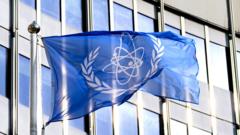In a landmark decision, the International Atomic Energy Agency (IAEA) has officially classified Iran as being in breach of its nuclear non-proliferation commitments, marking a significant escalation in the ongoing tensions surrounding Tehran's nuclear activities. The resolution was passed with support from 19 of the 35 member nations of the IAEA board, including the United States, United Kingdom, France, and Germany, highlighting Iran’s insufficient cooperation regarding its undeclared nuclear materials and activities.
Iran Breaches Nuclear Obligations, IAEA Issues Formal Warning

Iran Breaches Nuclear Obligations, IAEA Issues Formal Warning
The International Atomic Energy Agency reports Iran's nuclear program is non-compliant, raising geopolitical tensions.
The IAEA has expressed serious concerns regarding Iran's growing stockpile of enriched uranium, which poses the risk of being used for nuclear weapon production. A recent report indicated that Iran has enough uranium enriched to 60% purity, which is alarmingly near weapons-grade levels necessary for up to nine nuclear bombs. Iran defends its nuclear program as peaceful, vehemently opposing the claims of non-compliance.
The current situation marks a crucial pivot from the 2015 nuclear deal, which sought to impose restrictions on Iran's nuclear ambitions in exchange for economic sanction relief. The United States withdrew from this agreement under former President Donald Trump, reigniting tensions as Iran progressively violated its commitments since 2019, especially in enrichments.
During the IAEA meeting, nations such as Russia and China opposed the resolution, while several others abstained. The motion stresses the urgency for Iran to comply with its obligations and underscores the retrospective concerns related to the diverted nuclear materials that require safeguarding.
As diplomatic conversations hang in the balance, Iran has reacted to the IAEA's actions by announcing plans to build a new enrichment facility and upgrade its centrifuge technology. Iranian leaders criticize the resolution as politically motivated, claiming it complicates ongoing negotiations for a new nuclear agreement with the U.S.
Discussions concerning a potential deal are underway, but doubts remain high following intense rhetoric from both sides, with President Trump suggesting a lack of confidence in striking a suitable agreement. The international community continues to observe this situation closely, with implications of renewed tension in the Middle East, prompting strategic military advisories from the U.S. regarding embassies in the region.
As diplomatic efforts progress, the potential reintroduction of UN sanctions looms if Iran remains defiant, further complicating the intricate web of nuclear diplomacy in the Middle East.
The current situation marks a crucial pivot from the 2015 nuclear deal, which sought to impose restrictions on Iran's nuclear ambitions in exchange for economic sanction relief. The United States withdrew from this agreement under former President Donald Trump, reigniting tensions as Iran progressively violated its commitments since 2019, especially in enrichments.
During the IAEA meeting, nations such as Russia and China opposed the resolution, while several others abstained. The motion stresses the urgency for Iran to comply with its obligations and underscores the retrospective concerns related to the diverted nuclear materials that require safeguarding.
As diplomatic conversations hang in the balance, Iran has reacted to the IAEA's actions by announcing plans to build a new enrichment facility and upgrade its centrifuge technology. Iranian leaders criticize the resolution as politically motivated, claiming it complicates ongoing negotiations for a new nuclear agreement with the U.S.
Discussions concerning a potential deal are underway, but doubts remain high following intense rhetoric from both sides, with President Trump suggesting a lack of confidence in striking a suitable agreement. The international community continues to observe this situation closely, with implications of renewed tension in the Middle East, prompting strategic military advisories from the U.S. regarding embassies in the region.
As diplomatic efforts progress, the potential reintroduction of UN sanctions looms if Iran remains defiant, further complicating the intricate web of nuclear diplomacy in the Middle East.























